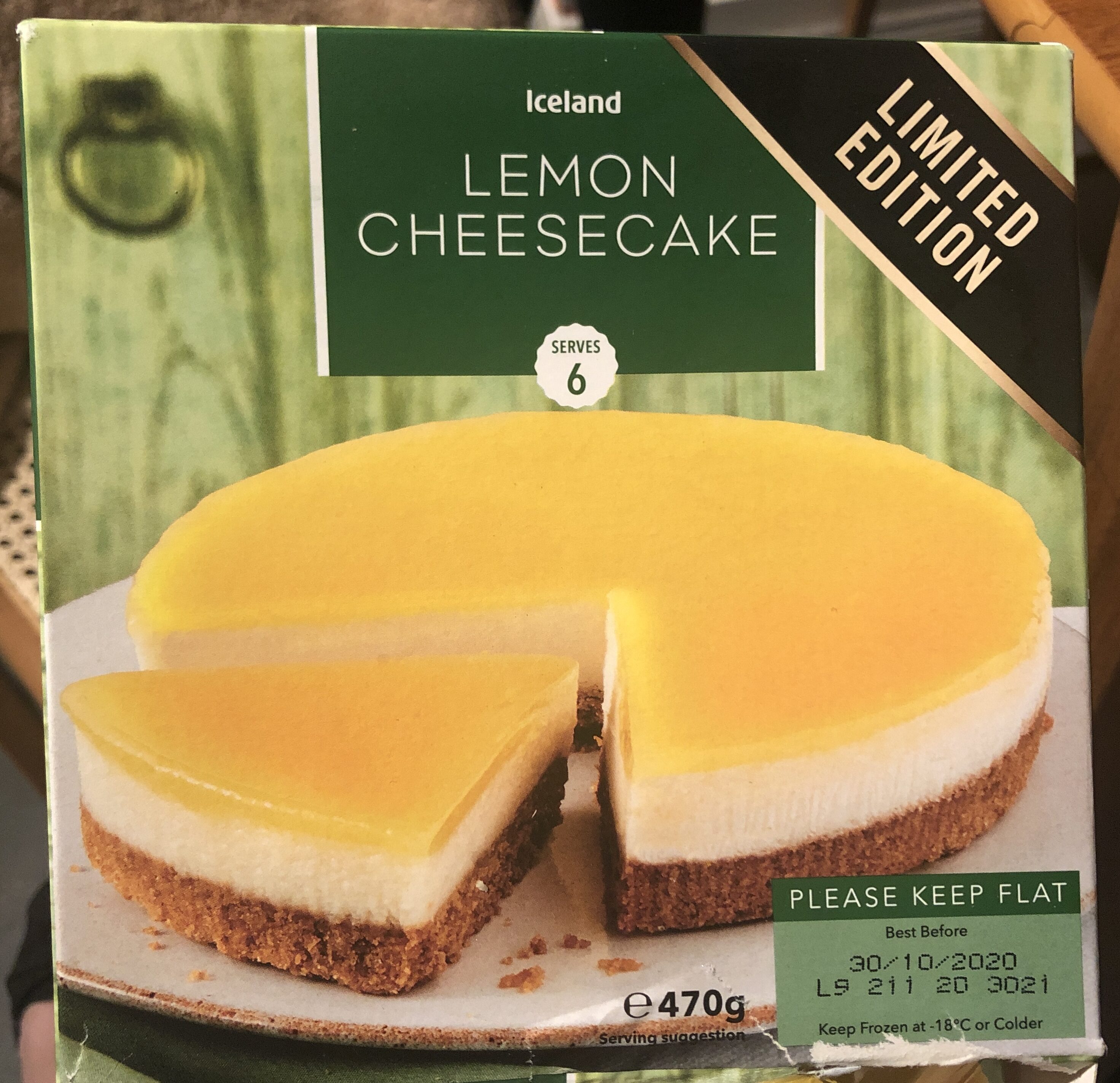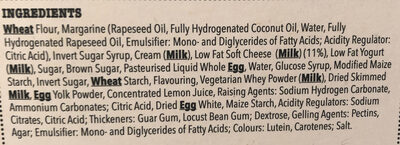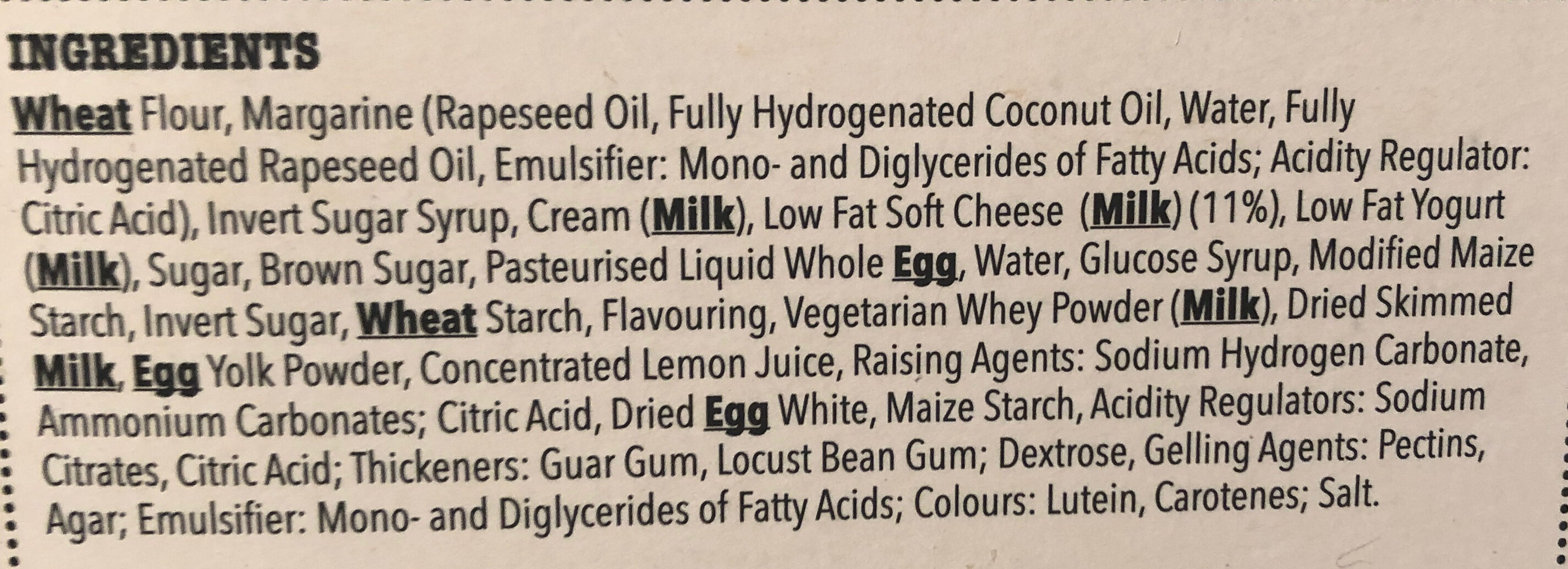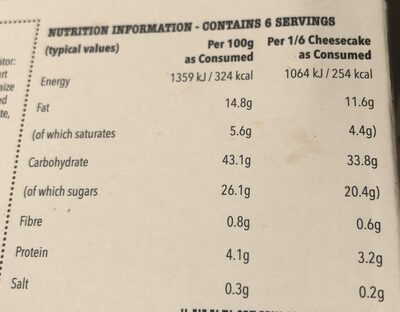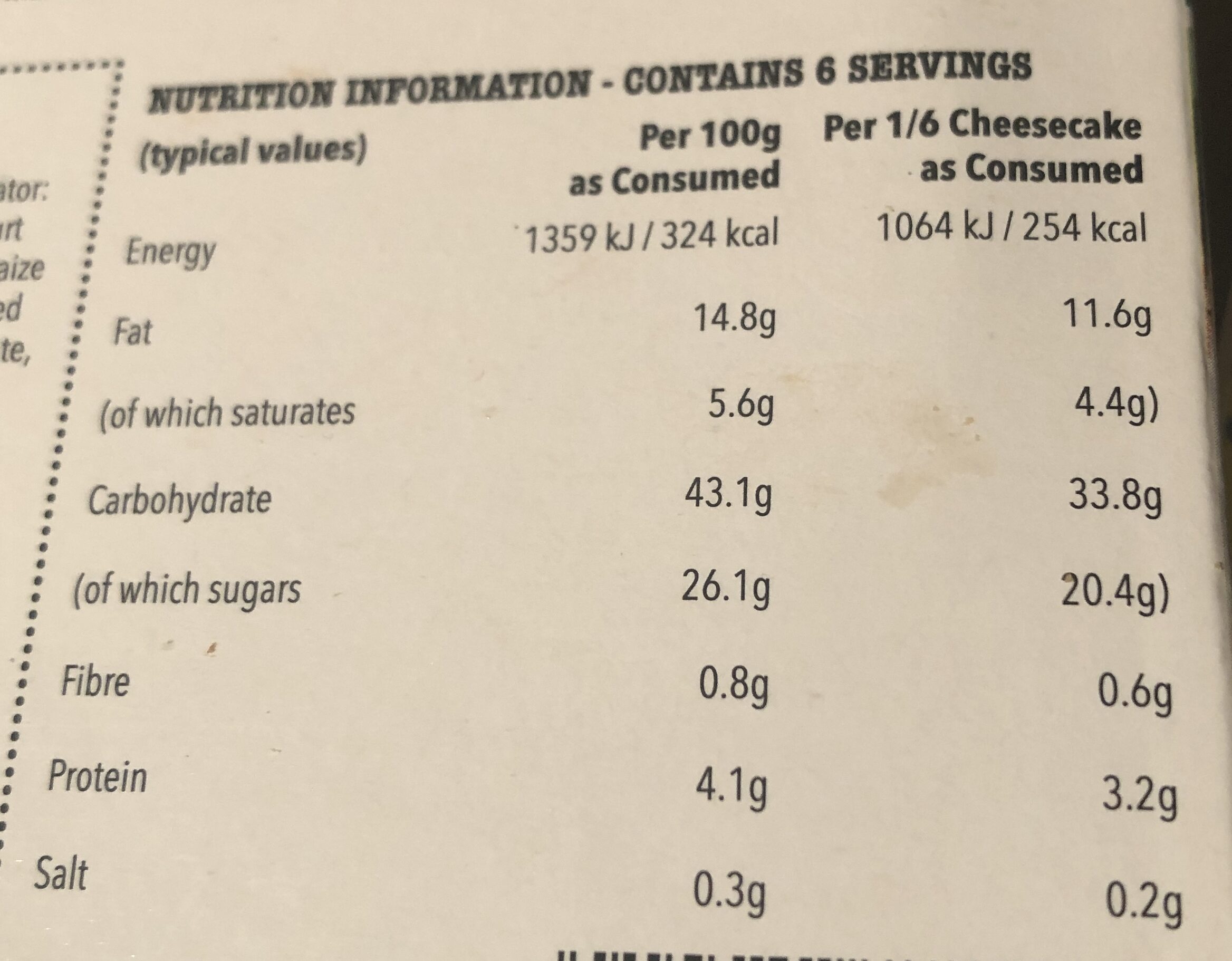Help us make food transparency the norm!
As a non-profit organization, we depend on your donations to continue informing consumers around the world about what they eat.
The food revolution starts with you!
Lemon Cheesecake - Iceland - 470 g
Lemon Cheesecake - Iceland - 470 g
This product page is not complete. You can help to complete it by editing it and adding more data from the photos we have, or by taking more photos using the app for Android or iPhone/iPad. Thank you!
×
Barcode: 5010482772437 (EAN / EAN-13)
Quantity: 470 g
Brands: Iceland
Categories: Snacks, Sweet snacks, Biscuits and cakes, Cakes, Cheesecakes, Lemon cheesecakes
Countries where sold: United Kingdom
Matching with your preferences
Health
Ingredients
-
49 ingredients
Wheat Flour, Margarine (Rapeseed Oil, Fully Hydrogenated Coconut Oil, Water, Fully Hydrogenated Rapeseed Oil, Emulsifier: Mono - and Diglycerides of Fatty Acids; Acidity Regulator: Citric Acid), Invert Sugar Syrup, Cream (Milk), Low Fat Soft Cheese (Milk) (11%), Low Fat Yogurt (Milk), Sugar, Brown Sugar, Pasteurised Liquid Whole Egg, Water, Glucose Syrup, Modified Maize Starch, Invert Sugar, Wheat Starch, Flavouring, Vegetarian Whey Powder (Milk), Dried Skimmed Milk, Egg Yolk Powder, Concentrated Lemon Juice, Raising Agents: Sodium Hydrogen Carbonate, Ammonium Carbonates; Citric Acid, Dried Egg White, Maize Starch, Acidity Regulators: Sodium Citrates, Citric Acid; Thickeners: Guar Gum, Locust Bean Gum; Dextrose, Gelling Agents: Pectins, Agar; Emulsifier: Mono - and Diglycerides of Fatty Acids; Colours: Lutein, Carotenes; Salt.Allergens: Gluten, Milk
Food processing
-
Ultra processed foods
Elements that indicate the product is in the 4 - Ultra processed food and drink products group:
- Additive: E160a - Carotene
- Additive: E161b - Lutein
- Additive: E406 - Agar
- Additive: E410 - Locust bean gum
- Additive: E412 - Guar gum
- Additive: E440 - Pectins
- Additive: E471 - Mono- and diglycerides of fatty acids
- Ingredient: Colour
- Ingredient: Dextrose
- Ingredient: Emulsifier
- Ingredient: Flavouring
- Ingredient: Gelling agent
- Ingredient: Glucose
- Ingredient: Glucose syrup
- Ingredient: Invert sugar
- Ingredient: Thickener
- Ingredient: Whey
Food products are classified into 4 groups according to their degree of processing:
- Unprocessed or minimally processed foods
- Processed culinary ingredients
- Processed foods
- Ultra processed foods
The determination of the group is based on the category of the product and on the ingredients it contains.
Additives
-
E160a - Carotene
Carotene: The term carotene -also carotin, from the Latin carota, "carrot"- is used for many related unsaturated hydrocarbon substances having the formula C40Hx, which are synthesized by plants but in general cannot be made by animals -with the exception of some aphids and spider mites which acquired the synthesizing genes from fungi-. Carotenes are photosynthetic pigments important for photosynthesis. Carotenes contain no oxygen atoms. They absorb ultraviolet, violet, and blue light and scatter orange or red light, and -in low concentrations- yellow light. Carotenes are responsible for the orange colour of the carrot, for which this class of chemicals is named, and for the colours of many other fruits, vegetables and fungi -for example, sweet potatoes, chanterelle and orange cantaloupe melon-. Carotenes are also responsible for the orange -but not all of the yellow- colours in dry foliage. They also -in lower concentrations- impart the yellow coloration to milk-fat and butter. Omnivorous animal species which are relatively poor converters of coloured dietary carotenoids to colourless retinoids have yellowed-coloured body fat, as a result of the carotenoid retention from the vegetable portion of their diet. The typical yellow-coloured fat of humans and chickens is a result of fat storage of carotenes from their diets. Carotenes contribute to photosynthesis by transmitting the light energy they absorb to chlorophyll. They also protect plant tissues by helping to absorb the energy from singlet oxygen, an excited form of the oxygen molecule O2 which is formed during photosynthesis. β-Carotene is composed of two retinyl groups, and is broken down in the mucosa of the human small intestine by β-carotene 15‚15'-monooxygenase to retinal, a form of vitamin A. β-Carotene can be stored in the liver and body fat and converted to retinal as needed, thus making it a form of vitamin A for humans and some other mammals. The carotenes α-carotene and γ-carotene, due to their single retinyl group -β-ionone ring-, also have some vitamin A activity -though less than β-carotene-, as does the xanthophyll carotenoid β-cryptoxanthin. All other carotenoids, including lycopene, have no beta-ring and thus no vitamin A activity -although they may have antioxidant activity and thus biological activity in other ways-. Animal species differ greatly in their ability to convert retinyl -beta-ionone- containing carotenoids to retinals. Carnivores in general are poor converters of dietary ionone-containing carotenoids. Pure carnivores such as ferrets lack β-carotene 15‚15'-monooxygenase and cannot convert any carotenoids to retinals at all -resulting in carotenes not being a form of vitamin A for this species-; while cats can convert a trace of β-carotene to retinol, although the amount is totally insufficient for meeting their daily retinol needs.Source: Wikipedia
-
E330 - Citric acid
Citric acid is a natural organic acid found in citrus fruits such as lemons, oranges, and limes.
It is widely used in the food industry as a flavor enhancer, acidulant, and preservative due to its tart and refreshing taste.
Citric acid is safe for consumption when used in moderation and is considered a generally recognized as safe (GRAS) food additive by regulatory agencies worldwide.
-
E331 - Sodium citrates
Sodium citrate: Sodium citrate may refer to any of the sodium salts of citrate -though most commonly the third-: Monosodium citrate Disodium citrate Trisodium citrateThe three forms of the salt are collectively known by the E number E331. Sodium citrates are used as acidity regulators in food and drinks, and also as emulsifiers for oils. They enable cheeses to melt without becoming greasy.Source: Wikipedia
-
E406 - Agar
Agar: Agar -pronounced , sometimes - or agar-agar is a jelly-like substance, obtained from red algae.Agar is a mixture of two components: the linear polysaccharide agarose, and a heterogeneous mixture of smaller molecules called agaropectin. It forms the supporting structure in the cell walls of certain species of algae, and is released on boiling. These algae are known as agarophytes, and belong to the Rhodophyta -red algae- phylum.Agar has been used as an ingredient in desserts throughout Asia, and also as a solid substrate to contain culture media for microbiological work. Agar can be used as a laxative, an appetite suppressant, a vegetarian substitute for gelatin, a thickener for soups, in fruit preserves, ice cream, and other desserts, as a clarifying agent in brewing, and for sizing paper and fabrics.The gelling agent in agar is an unbranched polysaccharide obtained from the cell walls of some species of red algae, primarily from tengusa -Gelidiaceae- and ogonori -Gracilaria-. For commercial purposes, it is derived primarily from ogonori. In chemical terms, agar is a polymer made up of subunits of the sugar galactose.Source: Wikipedia
-
E410 - Locust bean gum
Locust bean gum: Locust bean gum -LBG, also known as carob gum, carob bean gum, carobin, E410- is a thickening agent and a gelling agent used in food technology.Source: Wikipedia
-
E412 - Guar gum
Guar gum (E412) is a natural food additive derived from guar beans.
This white, odorless powder is valued for its remarkable thickening and stabilizing properties, making it a common ingredient in various food products, including sauces, dressings, and ice creams.
When used in moderation, guar gum is considered safe for consumption, with no known adverse health effects.
-
E440 - Pectins
Pectins (E440) are natural carbohydrates, predominantly found in fruits, that act as gelling agents in the food industry, creating the desirable jelly-like texture in jams, jellies, and marmalades.
Pectins stabilize and thicken various food products, such as desserts, confectioneries, and beverages, ensuring a uniform consistency and quality.
Recognized as safe by various health authorities, pectins have been widely used without notable adverse effects when consumed in typical dietary amounts.
-
E471 - Mono- and diglycerides of fatty acids
Mono- and diglycerides of fatty acids (E471), are food additives commonly used as emulsifiers in various processed foods.
These compounds consist of glycerol molecules linked to one or two fatty acid chains, which help stabilize and blend water and oil-based ingredients. E471 enhances the texture and shelf life of products like margarine, baked goods, and ice cream, ensuring a smooth and consistent texture.
It is generally considered safe for consumption within established regulatory limits.
-
E500 - Sodium carbonates
Sodium carbonates (E500) are compounds commonly used in food preparation as leavening agents, helping baked goods rise by releasing carbon dioxide when they interact with acids.
Often found in baking soda, they regulate the pH of food, preventing it from becoming too acidic or too alkaline. In the culinary world, sodium carbonates can also enhance the texture and structure of foods, such as noodles, by modifying the gluten network.
Generally recognized as safe, sodium carbonates are non-toxic when consumed in typical amounts found in food.
-
E500ii - Sodium hydrogen carbonate
Sodium hydrogen carbonate, also known as E500ii, is a food additive commonly used as a leavening agent.
When added to recipes, it releases carbon dioxide gas upon exposure to heat or acids, causing dough to rise and resulting in a light, fluffy texture in baked goods.
It is generally recognized as safe (GRAS) by regulatory authorities when used in appropriate quantities and poses no significant health risks when consumed in typical food applications.
-
E503 - Ammonium carbonates
Ammonium carbonate: Ammonium carbonate is a salt with the chemical formula -NH4-2CO3. Since it readily degrades to gaseous ammonia and carbon dioxide upon heating, it is used as a leavening agent and also as smelling salt. It is also known as baker's ammonia and was a predecessor to the more modern leavening agents baking soda and baking powder. It is a component of what was formerly known as sal volatile and salt of hartshorn.Source: Wikipedia
Ingredients analysis
-
May contain palm oil
Ingredients that may contain palm oil: E471, E471, E160a
-
Non-vegan
Non-vegan ingredients: Cream, Skimmed milk soft cheese, Skimmed yogurt, Liquid whole egg, Whey powder, Skimmed milk, Egg yolk powder, Egg white
-
Vegetarian status unknown
Unrecognized ingredients: Margarine, Invert sugar
-
Details of the analysis of the ingredients
: Wheat Flour, Margarine (Rapeseed Oil, Fully Hydrogenated Coconut Oil, Water, Rapeseed Oil, Emulsifier (mono- and Diglycerides of Fatty Acids), Acidity Regulator (Citric Acid)), Invert Sugar Syrup, Cream, Low Fat Soft Cheese, Low Fat Yogurt, Sugar, Brown Sugar, Liquid Whole Egg, Water, Glucose Syrup, Modified Maize Starch, Invert Sugar, Wheat Starch, Flavouring, Whey Powder, Skimmed Milk, Egg Yolk Powder, Concentrated Lemon Juice, Raising Agents (Sodium Hydrogen Carbonate), Ammonium Carbonates, Citric Acid, Egg White, Maize Starch, Acidity Regulators (Sodium Citrates), Citric Acid, Thickeners (Guar Gum), Locust Bean Gum, Dextrose, Gelling Agents (Pectins), Agar, Emulsifier (mono- and Diglycerides of Fatty Acids), Colours (Lutein), Carotenes, Salt- Wheat Flour -> en:wheat-flour - vegan: yes - vegetarian: yes - ciqual_proxy_food_code: 9410 - percent_min: 2.85714285714286 - percent_max: 100
- Margarine -> en:margarine - percent_min: 0 - percent_max: 50
- Rapeseed Oil -> en:rapeseed-oil - vegan: yes - vegetarian: yes - from_palm_oil: no - percent_min: 0 - percent_max: 50
- Fully Hydrogenated Coconut Oil -> en:hydrogenated-coconut-oil - vegan: yes - vegetarian: yes - from_palm_oil: no - ciqual_food_code: 16040 - percent_min: 0 - percent_max: 25
- Water -> en:water - vegan: yes - vegetarian: yes - ciqual_food_code: 18066 - percent_min: 0 - percent_max: 16.6666666666667
- Rapeseed Oil -> en:rapeseed-oil - vegan: yes - vegetarian: yes - from_palm_oil: no - percent_min: 0 - percent_max: 12.5
- Emulsifier -> en:emulsifier - percent_min: 0 - percent_max: 10
- mono- and Diglycerides of Fatty Acids -> en:e471 - vegan: maybe - vegetarian: maybe - from_palm_oil: maybe - percent_min: 0 - percent_max: 10
- Acidity Regulator -> en:acidity-regulator - percent_min: 0 - percent_max: 8.33333333333333
- Citric Acid -> en:e330 - vegan: yes - vegetarian: yes - percent_min: 0 - percent_max: 8.33333333333333
- Invert Sugar Syrup -> en:invert-sugar-syrup - vegan: yes - vegetarian: yes - percent_min: 0 - percent_max: 33.3333333333333
- Cream -> en:cream - vegan: no - vegetarian: yes - ciqual_food_code: 19402 - percent_min: 0 - percent_max: 25
- Low Fat Soft Cheese -> en:skimmed-milk-soft-cheese - vegan: no - vegetarian: maybe - ciqual_proxy_food_code: 12999 - percent_min: 0 - percent_max: 20
- Low Fat Yogurt -> en:skimmed-yogurt - vegan: no - vegetarian: yes - ciqual_proxy_food_code: 19593 - percent_min: 0 - percent_max: 16.6666666666667
- Sugar -> en:sugar - vegan: yes - vegetarian: yes - ciqual_proxy_food_code: 31016 - percent_min: 0 - percent_max: 14.2857142857143
- Brown Sugar -> en:brown-sugar - vegan: yes - vegetarian: yes - ciqual_food_code: 31017 - percent_min: 0 - percent_max: 12.5
- Liquid Whole Egg -> en:liquid-whole-egg - vegan: no - vegetarian: yes - ciqual_food_code: 22000 - percent_min: 0 - percent_max: 11.1111111111111
- Water -> en:water - vegan: yes - vegetarian: yes - ciqual_food_code: 18066 - percent_min: 0 - percent_max: 10
- Glucose Syrup -> en:glucose-syrup - vegan: yes - vegetarian: yes - ciqual_proxy_food_code: 31016 - percent_min: 0 - percent_max: 9.09090909090909
- Modified Maize Starch -> en:modified-corn-starch - vegan: yes - vegetarian: yes - ciqual_food_code: 9510 - percent_min: 0 - percent_max: 8.33333333333333
- Invert Sugar -> en:invert-sugar - percent_min: 0 - percent_max: 7.69230769230769
- Wheat Starch -> en:wheat-starch - vegan: yes - vegetarian: yes - ciqual_proxy_food_code: 9510 - percent_min: 0 - percent_max: 7.14285714285714
- Flavouring -> en:flavouring - vegan: maybe - vegetarian: maybe - percent_min: 0 - percent_max: 5
- Whey Powder -> en:whey-powder - labels: en:vegetarian - vegan: no - vegetarian: en:yes - percent_min: 0 - percent_max: 5
- Skimmed Milk -> en:skimmed-milk - vegan: no - vegetarian: yes - ciqual_proxy_food_code: 19051 - percent_min: 0 - percent_max: 5
- Egg Yolk Powder -> en:egg-yolk-powder - vegan: no - vegetarian: yes - ciqual_food_code: 22003 - percent_min: 0 - percent_max: 5
- Concentrated Lemon Juice -> en:concentrated-lemon-juice - vegan: yes - vegetarian: yes - ciqual_food_code: 2028 - percent_min: 0 - percent_max: 5
- Raising Agents -> en:raising-agent - percent_min: 0 - percent_max: 5
- Sodium Hydrogen Carbonate -> en:e500ii - vegan: yes - vegetarian: yes - percent_min: 0 - percent_max: 5
- Ammonium Carbonates -> en:e503 - vegan: yes - vegetarian: yes - percent_min: 0 - percent_max: 4.76190476190476
- Citric Acid -> en:e330 - vegan: yes - vegetarian: yes - percent_min: 0 - percent_max: 4.54545454545455
- Egg White -> en:egg-white - vegan: no - vegetarian: yes - ciqual_food_code: 22001 - percent_min: 0 - percent_max: 4.34782608695652
- Maize Starch -> en:corn-starch - vegan: yes - vegetarian: yes - ciqual_food_code: 9510 - percent_min: 0 - percent_max: 4.16666666666667
- Acidity Regulators -> en:acidity-regulator - percent_min: 0 - percent_max: 4
- Sodium Citrates -> en:e331 - vegan: yes - vegetarian: yes - percent_min: 0 - percent_max: 4
- Citric Acid -> en:e330 - vegan: yes - vegetarian: yes - percent_min: 0 - percent_max: 3.84615384615385
- Thickeners -> en:thickener - percent_min: 0 - percent_max: 3.7037037037037
- Guar Gum -> en:e412 - vegan: yes - vegetarian: yes - percent_min: 0 - percent_max: 3.7037037037037
- Locust Bean Gum -> en:e410 - vegan: yes - vegetarian: yes - percent_min: 0 - percent_max: 3.57142857142857
- Dextrose -> en:dextrose - vegan: yes - vegetarian: yes - ciqual_proxy_food_code: 31016 - percent_min: 0 - percent_max: 3.44827586206897
- Gelling Agents -> en:gelling-agent - percent_min: 0 - percent_max: 3.33333333333333
- Pectins -> en:e440a - vegan: yes - vegetarian: yes - percent_min: 0 - percent_max: 3.33333333333333
- Agar -> en:e406 - vegan: yes - vegetarian: yes - ciqual_food_code: 11084 - percent_min: 0 - percent_max: 3.2258064516129
- Emulsifier -> en:emulsifier - percent_min: 0 - percent_max: 3.125
- mono- and Diglycerides of Fatty Acids -> en:e471 - vegan: maybe - vegetarian: maybe - from_palm_oil: maybe - percent_min: 0 - percent_max: 3.125
- Colours -> en:colour - percent_min: 0 - percent_max: 3.03030303030303
- Lutein -> en:e161b - vegan: yes - vegetarian: yes - percent_min: 0 - percent_max: 3.03030303030303
- Carotenes -> en:e160a - vegan: maybe - vegetarian: maybe - from_palm_oil: maybe - percent_min: 0 - percent_max: 2.94117647058824
- Salt -> en:salt - vegan: yes - vegetarian: yes - ciqual_food_code: 11058 - percent_min: 0 - percent_max: 0.3
Nutrition
-
Poor nutritional quality
⚠ ️Warning: the amount of fruits, vegetables and nuts is not specified on the label, it was estimated from the list of ingredients: 13This product is not considered a beverage for the calculation of the Nutri-Score.
Positive points: 0
- Proteins: 2 / 5 (value: 4.1, rounded value: 4.1)
- Fiber: 0 / 5 (value: 0.8, rounded value: 0.8)
- Fruits, vegetables, nuts, and colza/walnut/olive oils: 0 / 5 (value: 13.66089957101, rounded value: 13.7)
Negative points: 15
- Energy: 4 / 10 (value: 1356, rounded value: 1356)
- Sugars: 5 / 10 (value: 26.1, rounded value: 26.1)
- Saturated fat: 5 / 10 (value: 5.6, rounded value: 5.6)
- Sodium: 1 / 10 (value: 120, rounded value: 120)
The points for proteins are not counted because the negative points are greater or equal to 11.
Nutritional score: (15 - 0)
Nutri-Score:
-
Nutrient levels
-
Fat in moderate quantity (14.8%)
What you need to know- A high consumption of fat, especially saturated fats, can raise cholesterol, which increases the risk of heart diseases.
Recommendation: Limit the consumption of fat and saturated fat- Choose products with lower fat and saturated fat content.
-
Saturated fat in high quantity (5.6%)
What you need to know- A high consumption of fat, especially saturated fats, can raise cholesterol, which increases the risk of heart diseases.
Recommendation: Limit the consumption of fat and saturated fat- Choose products with lower fat and saturated fat content.
-
Sugars in high quantity (26.1%)
What you need to know- A high consumption of sugar can cause weight gain and tooth decay. It also augments the risk of type 2 diabetes and cardio-vascular diseases.
Recommendation: Limit the consumption of sugar and sugary drinks- Sugary drinks (such as sodas, fruit beverages, and fruit juices and nectars) should be limited as much as possible (no more than 1 glass a day).
- Choose products with lower sugar content and reduce the consumption of products with added sugars.
-
Salt in moderate quantity (0.3%)
What you need to know- A high consumption of salt (or sodium) can cause raised blood pressure, which can increase the risk of heart disease and stroke.
- Many people who have high blood pressure do not know it, as there are often no symptoms.
- Most people consume too much salt (on average 9 to 12 grams per day), around twice the recommended maximum level of intake.
Recommendation: Limit the consumption of salt and salted food- Reduce the quantity of salt used when cooking, and don't salt again at the table.
- Limit the consumption of salty snacks and choose products with lower salt content.
-
-
Nutrition facts
Nutrition facts As sold
for 100 g / 100 mlCompared to: Lemon cheesecakes Energy 1,356 kj
(324 kcal)- Fat 14.8 g -9% Saturated fat 5.6 g -27% Carbohydrates 43.1 g +13% Sugars 26.1 g +19% Fiber 0.8 g +9% Proteins 4.1 g +12% Salt 0.3 g +1% Fruits‚ vegetables‚ nuts and rapeseed‚ walnut and olive oils (estimate from ingredients list analysis) 13.661 %
Environment
-
Eco-Score C - Moderate environmental impact
The Eco-Score is an experimental score that summarizes the environmental impacts of food products.→ The Eco-Score was initially developped for France and it is being extended to other European countries. The Eco-Score formula is subject to change as it is regularly improved to make it more precise and better suited to each country.Life cycle analysis
-
Average impact of products of the same category: B (Score: 70/100)
Category: Cheesecake, refrigerated
Category: Cheesecake, refrigerated
- PEF environmental score: 0.35 (the lower the score, the lower the impact)
- including impact on climate change: 2.88 kg CO2 eq/kg of product
Stage Impact Agriculture
73.5 %Processing
14.0 %Packaging
4.5 %Transportation
4.7 %Distribution
2.6 %Consumption
0.7 %
Bonuses and maluses
-
Missing origins of ingredients information
Malus: -5
⚠ ️ The origins of the ingredients of this product are not indicated.
If they are indicated on the packaging, you can modify the product sheet and add them.
If you are the manufacturer of this product, you can send us the information with our free platform for producers.
-
Missing packaging information for this product
Malus: -15
⚠ ️ The information about the packaging of this product is not filled in.⚠ ️ For a more precise calculation of the Eco-Score, you can modify the product page and add them.
If you are the manufacturer of this product, you can send us the information with our free platform for producers.
Eco-Score for this product
-
Impact for this product: C (Score: 50/100)
Product: Lemon Cheesecake - Iceland - 470 g
Life cycle analysis score: 70
Sum of bonuses and maluses: -20
Final score: 50/100
-
Carbon footprint
-
Equal to driving 1.5 km in a petrol car
288 g CO² per 100g of product
The carbon emission figure comes from ADEME's Agribalyse database, for the category: Cheesecake, refrigerated (Source: ADEME Agribalyse Database)
Stage Impact Agriculture
76.2 %Processing
8.6 %Packaging
6.5 %Transportation
7.1 %Distribution
1.3 %Consumption
0.2 %
Packaging
-
Missing packaging information for this product
⚠ ️ The information about the packaging of this product is not filled in.Take a photo of the recycling information Take a photo of the recycling information
Transportation
-
Origins of ingredients
Missing origins of ingredients information
⚠ ️ The origins of the ingredients of this product are not indicated.
If they are indicated on the packaging, you can modify the product sheet and add them.
If you are the manufacturer of this product, you can send us the information with our free platform for producers.Add the origins of ingredients for this product Add the origins of ingredients for this product
Report a problem
-
Incomplete or incorrect information?
Category, labels, ingredients, allergens, nutritional information, photos etc.
If the information does not match the information on the packaging, please complete or correct it. Open Food Facts is a collaborative database, and every contribution is useful for all.
Data sources
Product added on by openfoodfacts-contributors
Last edit of product page on by moon-rabbit.
Product page also edited by roboto-app, teolemon.

